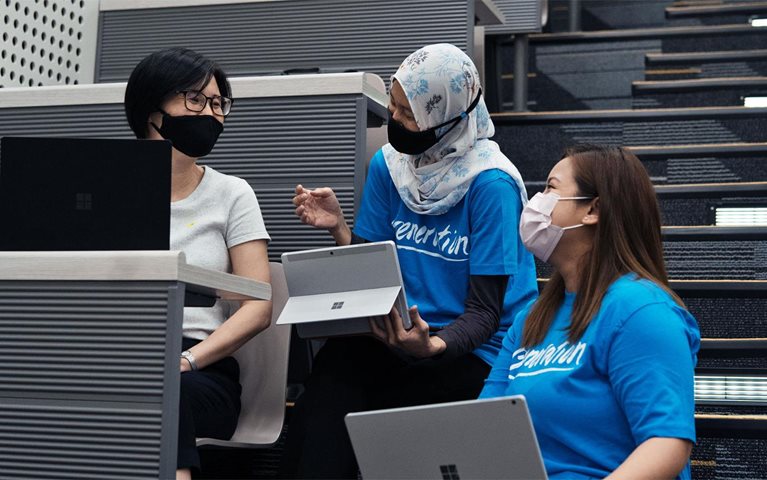There’s a hidden talent pool that most employers overlook—the more than 70 million workers in the US who are STARs, or workers ‘skilled through alternative routes.’ Whether through community college, workforce training, bootcamp or certificate programs, military service, or on-the-job learning, STARs have the skills for higher-wage jobs but often find themselves blocked from consideration.
This week, nonprofit Opportunity@Work and the Ad Council have launched a nationwide campaign to ‘Tear the Paper Ceiling ’ and encourage employers to change hiring practices. McKinsey is providing pro bono support to the effort through data and analytics tools that enable recruiters to recognize STARs and their skills.
“While companies scramble to find talent amid a perceived skills gap, many of their job postings have needlessly excluded half of the workers in the country who have the skills for higher-wage work,” says Byron Auguste , founder of Opportunity@Work and a former senior partner at McKinsey. “Companies like the ones we're proud to call partners in this effort—and those we hope will join—can lead the way by tapping into skilled talent from a far wider range of backgrounds.”
McKinsey has driven extensive research on skills-based hiring and human capital, and built data-driven solutions that help employers implement new ways of screening for knowledge, skills, and capacity to learn.
“A few years ago, we looked at many talent solutions in the market. There was a real risk of hard-wiring outdated notions of being a skilled worker,” says McKinsey partner Carolyn Pierce , who leads the technology team in the People and Organizational Performance practice. “Those systems gave little credit even to our own team members for skills learned on the job.”

People & Organizational Performance: Equipping people and organizations to unleash sustained performance
Carolyn and her team began collaborating with Opportunity@Work to prove the value and transferability of skills developed through work experience. “The Opportunity@Work team has done some incredible research that makes the business case for hiring STARs into today’s most in-demand jobs” says Carolyn. Our pro bono support will help make those insights more widely available to employers.
“We increasingly hear from employers that they want to recruit from the STARs talent pool,” says Shad Ahmed, COO of Opportunity@Work. “But they need practical, data-driven tools to replace degree screens and hire STARs. The portal we are building with support from McKinsey will help employers identify which jobs should be open to STARs and help them source from this valuable talent pool. It’s a key part of our mission to create vital technology infrastructure wired for inclusion.”
McKinsey is committed to tearing the ‘paper ceiling’ in our own hiring practices. “We have made significant investments to ensure that our own talent culture is both distinctive and inclusive, attracting and developing talent from a wide range of backgrounds,” says Katy George, senior partner and CHRO of McKinsey. “We are investing in more ways to recruit, hire, and grow STARs through a holistic approach that recognizes candidates’ skills and experience, problem-solving ability and intrinsic capabilities.”
McKinsey’s technology organization is at the forefront of this effort, with many entry-level roles already open to STARs who have the necessary knowledge and skills.
“We already have technologists at the firm—from entry-level through partner—who are STARs,” says Katy. “Our technology teams work on important and challenging problems, from helping organizations reduce their carbon footprint to improving worker safety. Our best path to solving these problems is to attract talented people from a wide range of backgrounds and experiences. Our recruiting teams are actively working to make more STARs aware of these opportunities and encourage them to apply.”
Creating more opportunities for STARs requires more than simply removing degree requirements from job descriptions. “We are scaling support for apprenticeships, bootcamps, and training programs to accelerate pathways for STARs into our firm” adds Katy. “The programs will help STAR talent build any additional skills needed for success at McKinsey and beyond.”
There are lots of reasons why someone might not begin or complete a degree that have nothing to do with their intrinsic abilities or potential. We know there are better ways to screen for talent and now we have the research and tools to back that up.
Byron is hopeful that having McKinsey as a sponsor of this campaign will encourage more employers to change their talent practices. “A lot of organizations know that McKinsey is very data driven. It’s a strong signal that they are helping to build better ways to screen for talent and creating opportunities for STARs through their own hiring,” he says.
Challenging the misconceptions associated with not having a college degree is key to helping more people tear through the paper ceiling. “Screening for a degree is one way to find people with skills and the capacity to learn—the problem is that you’re also screening for who had the right social and economic conditions in place to attend college,” says Carolyn.
“There are lots of reasons why someone might not begin or complete a degree that have nothing to do with their intrinsic abilities or potential,” Carolyn adds. “We know there are better ways to screen for talent and now we have the research and tools to back that up.”

